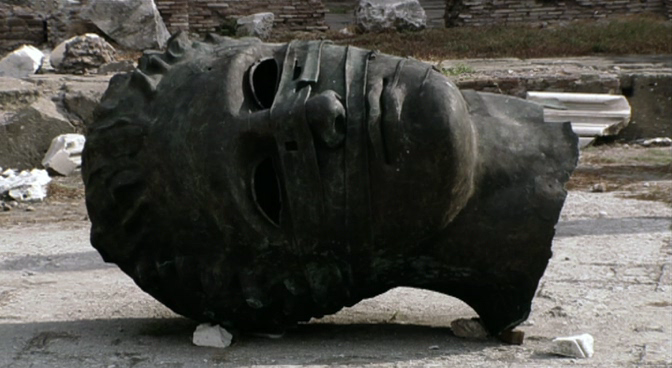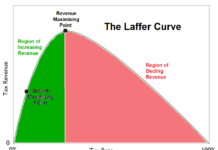The first welfare state in recorded history grew out of the late Roman Republic. At first, Rome only gave free grain to needy Romans. Eventually Rome removed the needs test, and began giving free grain to anyone who asked for it. Then Rome began giving out free wheat, and free barley, and pretty soon the pressure was on to give away free everything, which was best accomplished by simply giving away money.
When Julius Caesar made himself emperor, he cut Roman welfare rolls in half, but his great-nephew, Augustus Caesar, expanded welfare roles, and in the year 274, Emperor Aurelius declared Rome what we would today call a cradle-to-grave welfare state.
 Funding this welfare was difficult, as the Roman Denarius was made out of pure silver (the stamp of Rome attesting to its purity). Emperor Nero was the first to feel the pinch of the purse badly enough to play with the currency, which he reduced first to 94% silver, and then to 85%. The emperors who followed gradually reduced the Denarius to 0.02% silver.
Funding this welfare was difficult, as the Roman Denarius was made out of pure silver (the stamp of Rome attesting to its purity). Emperor Nero was the first to feel the pinch of the purse badly enough to play with the currency, which he reduced first to 94% silver, and then to 85%. The emperors who followed gradually reduced the Denarius to 0.02% silver.Rome, in the meantime, needed to procure more from their empire to provide for the demands of it’s Roman citizens. There were not enough material goods to go around, and so the price of everything throughout the empire rose. At the same time, most of the Roman legions were filled with non-Roman citizens, such as the Visigoths, and the Romans payed them in Denarius.
It does not take a rocket scientist to figure out what happens when the cost of supporting a family is going up, in real terms, and the value of the wages paid to one’s Army is going down, in real terms. At 0.02% purity, the Denarius the Visigoths were being paid in were worthless, and eventually, the Visigoth legions decided to take what they felt was owed to them, by sacking and looting Rome. Rome fell, and the dark ages ensued.
Fast forward to today. We are in a different environment than was Rome, in that our currency is the world’s reserve, and as such, a large number of dollars circulate overseas. Like Rome, we pay for foreign goods in our own currency. Our trade deficit acts like a leak in our M2 money supply, with more dollars going into foreign markets each year than come back, and the Federal Reserve plugs this leak by buying US treasury notes (aka ‘federal debt’), to expand the supply of money. This demand for federal treasury notes drives demand for US debt, which our Congress is only too happy to provide, by borrowing. As long as overseas markets are willing to expand their holdings of US dollars as fast as the fed expands the supply of money, the new dollars do not cause inflation, but should the trade imbalance start to shrink, those dollars will start to come back to the United States, and inflation will follow. We cannot simply print money any more than Rome could – nothing is free. I am not going to predict a Visigoth invasion of Washington DC, but clearly we are playing a destabilization game.
There are two universal truths to anything given away for free:
1) It is never enough, and
2) It is never appreciated.
I cannot tell you what the role of government should be in relation to welfare. That is a political, rather than an economic question. I can tell you only the economic pitfalls of a welfare system, which are based on the fact that free things are never considered ‘enough,’ and are never appreciated. Furthermore, the need to give some things to some people requires that an equal number of things be taken from other people. Higher taxation on those who work, mixed with greater welfare benefits to those who do not, reduces the marginal benefit of working, encouraging more people not to. As the percentage of people choosing not to work climbs, both the need for welfare, as well as the need to tax those still working, grows.
Government employees are paid with money taxed from the private-sector. Whatever taxes government workers pay simply goes back into the same pool their wages were drawn from, making government workers a constant drain on the private sector. Growing government has the same effect on taxation as does growth in the welfare base – tax rates on the private sector have to go up to pay for the new government workers, and just as with welfare recipients, government workers never feel that their pay is enough, and never show appreciation to the tax payers who pay them.
In fairness to government workers, the sense that pay is never enough, and that the ability to receive pay is never appreciated, is universal. The vast majority of people feel they are worth more than they are paid, and very few people are truly appreciative of the opportunity to work. The difference with government workers is that they have government sponsored unions, which donate to the same politicians with whom they then negotiate. As a result, government workers in America today make 78% more than private sector workers, doing the same kinds of work. Government workers also receive ever more generous pensions, paid for by taxing private sector workers, who generally have no pensions.
How do Democrats suggest we fix the problems facing private sector workers? Do they want to cut welfare? No. Instead, they suggest, among other things, that we move to a socialized medical system.
The United States has a partially private medical care industry, whereas most of the world has socialized medical care. Is it any surprise that the United States destroys the rest of the world in the amount medical research performed? The United States also has the best medical outcomes in the world, when measured by such things as cancer survival rates, and other indicators of actual medical outcomes. Is it really any coincidence that that best outcomes and the most research both occur where medical care is not ‘free’?
Somehow, the notion that the United States has the best medical care in the world has become a contentious fact. Many on the left will point to such things as life expectancies, and show that while the United States pays twice as much as other advanced nations on medical care, we don’t live as long. Such measurements are illegitimate, as they include things lifestyle choices that have nothing to do with the quality of medical care provided. Healthcare and medical care are not the same things, and while, due to poor lifestyle choices, Americans do not have the best healthcare in the world, we do have the highest quality of medical care, and by a wide margin.
Democrats also suggest that we improve things for private sector workers by making college ‘free’. My wife grew up in communist Poland, where college was ‘free’. It should go as no surprise that when my wife immigrated to the United States, Poland had one of the most educated work forces in the world, as well as one of the lowest paid work forces in all of Europe. Once education was ‘free’, everyone got an education, and nobody valued them.
Nothing is ‘free’. Everything has a cost. Neither medical care nor college will ever be ‘free’ for the private sector worker, who in a socialized system would have to pay not only for their own medical care, and their own college (or trade school) education, but also for the medical care, and college educations, of government workers and welfare recipients.
Also note that private sector medical care is a better trade-off than is socialized medical care, as shown here, and that, like medical care, ‘free’ college is a myth.
We have no reason to believe that putting people on welfare will make them better workers, nor better citizens. There is no evidence, even anecdotal, that supports such a claim. Making it unnecessary to work, rather, cheapens work to the point that fewer people are willing to do work. Until some socialist figures out a way to distribute that which is not produced, welfare will lead to a reduction in output, and a corresponding decrease in wealth.
Wealth and production are related. The quest to separate the two, creating wealth out of the public purse rather than out of the productivity of the citizenry, led to the fall of Rome. If we follow the same path, we will find the same outcome.


























[…] lessons about human existence were exposed. Why, for example, did Rome fall? I’ve actually written about that, and a big part of the reason was that they devalued their currency in order to fund a massive […]
[…] lessons about human existence were exposed. Why, for example, did Rome fall? I’ve actually written about that, and a big part of the reason was that they devalued their currency in order to fund a massive […]
Having drawn the parallel between Rome’s “buy political capital with other people’s money” and our own, it is curious that you then dein to “judge” the transactions which convert the earnings of some citizens into the dependence-driven loyalty of others as unjust.
“I cannot tell you what the role of government should be in relation to welfare. That is a political, rather than an economic question.” Won’t those wishing to receive at others’ expense forever and always outnumber those wishing to have their own earnings confiscated by force of law?
The difference between a Democracy and a Republic is in the purpose and measure of justice.
Democracy exists to manifest the will of the majority where our Constitutional Republic exists to defend the rights of the individual.
SO, Even if the majority strongly desire to eat the rich, their “right” to do so is NOT a “political question” in our Constitutional Republic, correct?
If public policy is not informed by the basic, immutable rights of the individual, then it WILL be informed by power-lust. Eventually, then, the society permitting this degradation will collapse.
Your article does a good job of pointing that out.
Somehow the formatting of this article has been lost. I’ll have to see if it can be fixed.
When I said it was a political question, I was drawing a distinction between economics and politics. I absolutely can tell you what I believe politically, but politics is inherently subjective.
So.. I agree with you…